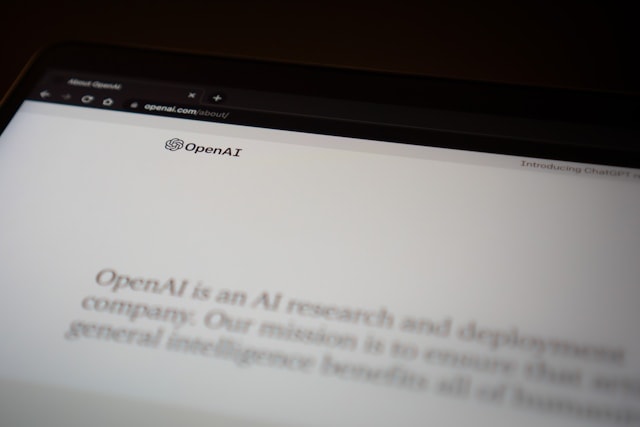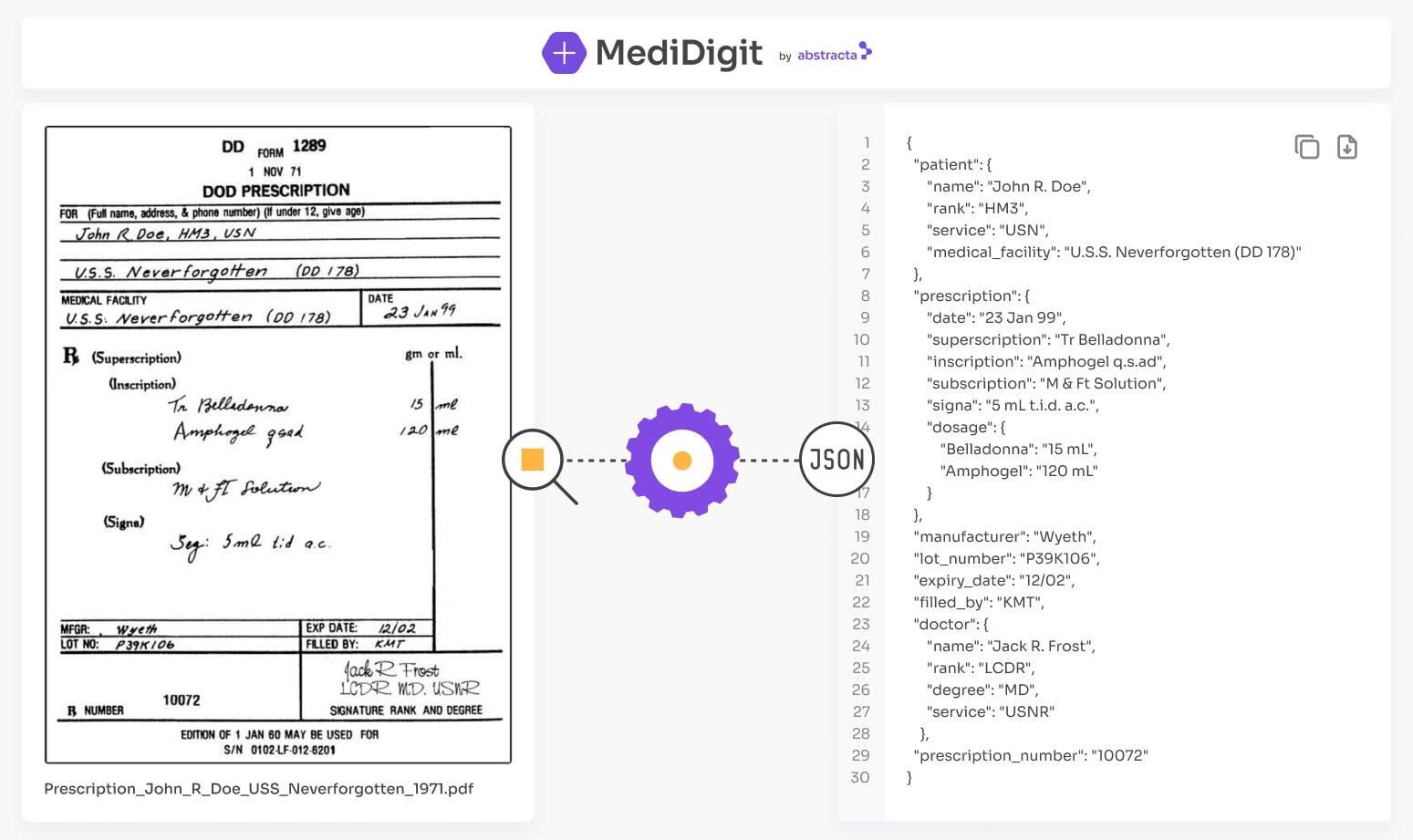Explore the power of Generative AI in the healthcare industry, its transformative applications, challenges, and future potential. Discover how we can help you boost quality and safety, to improve patient care and drive medical advancements.


Generative Artificial intelligence (also called Generative AI or GenAI) is revolutionizing healthcare, offering unprecedented opportunities to enhance patient care, streamline operations, and drive innovation.
From developing new treatment plans to generating synthetic medical data, enhancing diagnostics, accelerating drug discovery, and creating personalized treatment plans, and even overcoming the complex challenge of digitalizing hard-to-read prescriptions instantly, the potential applications are vast and transformative.
But what exactly is generative AI, and how does it differ from other forms of artificial intelligence in healthcare?
In this article, we answer this question and explore diverse applications and challenges of Generative AI in healthcare. We highlight real-world use cases and share a case study from Abstracta on the digitalization of hard-to-read prescriptions, demonstrating our commitment to improving patient care and driving medical advancements.
Interested in exploring how AI copilots or assistants can revolutionize your operations? Discover our AI Software Development solutions. Our global client reviews on Clutch speak for themselves.
What is Generative AI?


Generative AI refers to algorithms that can generate new content, such as text, images, or even music, based on the data they have been trained on. Unlike traditional AI, which focuses on recognizing patterns and making predictions, generative AI creates new possibilities.
In healthcare, this means developing new treatment plans, generating synthetic medical data, and even discovering new drugs, all of which require the acceptance and adoption by healthcare professionals. This transformative technology is setting the stage for a new era in medical science.
How Do Generative AI Models Differ from Traditional AI?
Traditional AI focuses on recognizing patterns and making predictions based on existing data. It excels at tasks like image recognition, natural language processing, and predictive analytics.
Generative AI, on the other hand, goes a step further by creating new data. This means it can generate new medical images, simulate molecular structures, and even create synthetic patient data for research and training purposes.
The key difference lies in generative AI’s ability to create new possibilities, rather than just analyzing existing ones.
How is Generative AI Used in Healthcare?
Generative AI in healthcare is used in various ways to improve patient care and streamline operations. Some significant applications include:
- Synthetic Medical Data: Generative AI can create synthetic medical data for research and training purposes without compromising patient privacy.
- Personalized Treatment Plans: AI models develop personalized treatment plans by integrating data from electronic health records and medical history, helping to ensure that each patient receives care tailored to their specific needs.
- Medical Image Analysis: AI-driven tools assist in the analysis of medical images, enhancing diagnostic accuracy and enabling early detection of diseases.
Want to dive deeper? You can do it by reading our Comprehensive Guide to Healthcare Software Solutions.
Promising Generative AI Applications in Healthcare Organizations
Generative AI in healthcare is opening doors to numerous applications.
It can help match patients with the right clinical trials and swiftly identify promising specimens for clinical trials. In actual fact, it is already streaming administrative tasks, such as scheduling, billing, and documentation, thereby improving operational efficiency and allowing healthcare providers to focus more on patient care.
Let’s get down to it!
1. Enhancing Diagnostic Precision
One of the most exciting areas is in diagnostics. Large language models (LLMs) play a crucial role in understanding medical data and improving diagnostic accuracy. By analyzing vast amounts of medical data, AI models can identify patterns and anomalies that might be missed by human eyes.
Generative artificial intelligence tools are enhancing the precision and efficiency of medical diagnostics. For instance, AI algorithms can analyze medical images, such as X-rays and MRIs, to detect early signs of diseases like cancer.
These tools can also predict the progression of diseases, allowing for more personalized treatment plans. The integration of AI in diagnostic processes not only speeds up the time to diagnosis but also reduces the likelihood of human error, providing a higher standard of care.
2. Accelerating Drug Discovery
Generative AI is also making waves in drug discovery. By simulating molecular structures and predicting their interactions, AI can identify potential drug candidates faster than traditional methods. This accelerates the development of new treatments and reduces costs.
For instance, AI-driven drug discovery platforms have already identified promising compounds for diseases that were previously considered difficult to treat, showcasing the potential of AI to revolutionize pharmaceutical research.
Explore how generative AI accelerates antiviral drug discovery in this study published by Phys.org.
3. Enhancing Telemedicine
With the rise of telemedicine, generative AI can play a crucial role in remote diagnostics and patient monitoring. We could explore how AI can enhance telehealth services, making them more efficient and accessible.
For example, AI algorithms can analyze patient data collected through telehealth platforms to provide real-time insights and recommendations, improving the quality of remote care.
Read this paper to discover how generative AI is revolutionizing telemedicine and remote patient monitoring.
4. Boosting AI-Driven Predictive Analytics
AI can also be used for predictive analytics in healthcare. This involves predicting patient outcomes, identifying at-risk populations, and optimizing resource allocation. These applications can significantly improve healthcare delivery and patient care.
As explained by this article, AI can examine patient data, including medical history, genetic information, and lifestyle factors to predict the risk of developing conditions such as hypertension, cardiovascular disease, and diabetes.
By leveraging predictive analytics, healthcare providers can proactively address potential health issues, reducing the need for emergency interventions and improving overall patient health.
5. Empowering Healthcare Providers Through Patient-Centric AI
Discussing how generative AI can be used to create more patient-centric healthcare solutions is very engaging. This includes AI-driven patient portals, personalized health recommendations, and virtual health assistants that can provide 24/7 support. These tools may empower both patients and healthcare professionals to take a more active role, improving engagement and satisfaction.
We highly recommend checking Med-Palm, a Google Research AI model designed for the medical field, providing expert-level answers to medical questions. We also suggest reading this patient-centered care case study, conducted by University Hospitals Coventry and Warwickshire NHS Trust and IBM.
Enhance patient care with us! We enable your healthcare systems to keep patient data safe and reliable, comply with regulations, and adhere to industry standards while reducing risk and costs.
Challenges and Considerations


While the benefits of generative AI in healthcare are immense, there are also significant ethical and privacy challenges. Let’s take a closer look at these challenges and how to overcome them:
- Ethics and Privacy
Healthcare organizations must consider patients’ perspectives and trust when integrating AI technologies. Handling sensitive patient data requires stringent measures to ensure privacy and security. Ensuring transparency in how AI models use and protect data is crucial for gaining public trust and acceptance.
Our Solution: We specialize in developing custom AI-driven tools and assistants that prioritize data privacy and security, ensuring full compatibility with HIPAA and HITRUST standards. Furthermore, our end-to-end testing services validate that AI models handle sensitive patient data securely and transparently, building trust and maintaining patient confidentiality.
- Quality and Safety
Ensuring the quality and safety of generative AI applications in healthcare is paramount. AI models must be accurate, reliable, and free from biases to be effective in clinical use.
Our Solution: We conduct comprehensive testing protocols, including bias testing, data integrity verification, and compliance with healthcare standards, to help you ensure that your AI tools are both safe and effective for clinical use.
- Mitigating Implementation Risks
Implementing generative AI in healthcare comes with technical and operational risks, such as integrating AI systems with existing infrastructure and ensuring user adoption.
Our Solution: We create custom AI tools and assistants designed to fit seamlessly into your workflows, maximizing the benefits of AI while minimizing potential downsides. We provide thorough testing, user training, and continuous monitoring to mitigate these risks. Our services ensure seamless integration of AI systems with existing infrastructure and facilitate smooth user adoption.
- Regulatory Compliance
Compliance with regulations is a critical aspect of deploying generative AI in healthcare. This includes adhering to local and international standards, obtaining necessary certifications, and ensuring transparency in AI operations.
Our Solution: We stay updated with evolving regulations and maintain open communication with regulatory bodies. By helping healthcare organizations navigate the complex landscape of regulatory compliance, we ensure that AI applications meet all necessary standards and certifications. Our custom AI solutions are designed with compliance in mind, streamlining the approval process for new AI tools.
- Governance and Oversight Structures
Implementing robust governance and oversight structures is crucial for ensuring the ethical and effective use of generative AI in healthcare. This includes establishing clear guidelines, monitoring AI performance, and ensuring compliance with regulatory standards.
Our Solution: We help healthcare organizations develop comprehensive governance frameworks, establish clear guidelines, and implement monitoring protocols. By implementing these robust governance and oversight structures, we help you maintain the highest standards of ethical AI use in healthcare.
- Data Quality and Integrity
Data is the lifeblood of generative AI. The quality and quantity of data used to train AI models directly impact their performance. Using data from various healthcare settings is crucial to train AI models effectively. Ensuring data validity and accuracy is essential for developing reliable AI tools.
Our Solution: We utilize diverse and comprehensive datasets to train AI algorithms. Our expertise in data management focuses on using valid and accurate data. Additionally, we generate synthetic data to supplement real-world data, providing a broader base for training and improving AI models. This approach helps in creating robust AI tools that perform reliably across different healthcare scenarios.
We invite you to read this article! Data Observability: What It Is and Why It Matters
Real-World Case Study


Case studies can highlight the practical benefits and challenges of generative AI tools adoption, offering valuable insights for other health care organizations considering similar initiatives.
In this section, we’ll share how we enhanced the efficiency of prescription digitization for a US hospital, reducing costs and improving patient care by automating the process.
Case Study
Our client, a major hospital in the USA, faced substantial challenges in manually digitizing medical prescriptions received via fax. Not only was this process time-consuming but also costly, impacting the quality of patient care and the productivity of the back office team.
Understanding Challenges
Our client handles between 500 and 600 prescriptions daily, received via fax for entry into the Epic healthcare system. Their back office team was manually digitizing it on a daily basis, with costs ranging from $4 to $8 per prescription.
A significant issue compounding this challenge was the difficulty in reading and interpreting doctors’ handwritten prescriptions, which are often illegible. This not only increased the time required for manual entry but also led to potential errors, further affecting patient care and operational efficiency.
Solutions and Activities
We developed a product for the digitization of medical prescriptions using Azure OpenAI Services. This solution is available both through a portal and via API integration with systems like Epic. In both cases, users can submit medical prescriptions and obtain structured information about the patient, treating physician, and diagnosis.
Our GenAI solution excels in reading and accurately interpreting handwritten prescriptions, reducing the burden on the back office team and minimizing errors associated with manual entry.
Results and Achievements
Our collaboration with the hospital led to significant improvements in their prescription digitization process, resulting in cost savings and enhanced patient care.
✅ Cost Reduction: Achieved an 80X reduction in digitization costs, lowering the cost per prescription from up to $8 to $0.1.
✅ Improved Accuracy: Maintained a 99% accuracy rate in automated information extraction, reducing the need for manual corrections.
✅ Enhanced Efficiency: Freed up the back office team to focus on more valuable tasks, improving overall productivity.
✅ Better Patient Care: Accelerated the digitization process, reducing patient wait times for studies and treatments, thus improving the quality of care.
How We Can Help You
With over 16 years of experience and a global presence, Abstracta is a leading technology solutions company specializing in AI software development and end-to-end software testing services.
We believe that actively bonding ties propels us further and helps us enhance our clients’ software. That’s why we’ve forged robust partnerships with industry leaders like Microsoft, Datadog, Tricentis, and Perforce, empowering us to incorporate cutting-edge technologies.
We craft strategies meticulously tailored to your unique needs and goals.
Visit our AI Software Development page and contact us to discuss how we can help you grow your business.


Follow us on Linkedin & X to be part of our community!
Recommended for You
Artificial Intelligence Business Ideas: Bring your Projects to Life
Generative AI for Dummies: A Comprehensive Guide for Beginners and Beyond
How We Unlocked Innovation Jointly with Microsoft AI Co-Innovation Lab
Tags In
Natalie Rodgers, Content Manager at Abstracta
Related Posts
Can Auto Playwright Boost Testing with AI?
Learn all about Auto Playwright and Playwright AI, the AI-driven evolution of Playwright for test automation. Get use cases, and guides from Abstracta.
Interfaces for All: Artificial Intelligence and Accessibility Testing
Learn how AI is revolutionizing accessibility testing with smarter analysis, realistic user simulations, and automated fixes. Explore key AI-powered tools for inclusive design.
Search
Contents
Categories
- Acceptance testing
- Accessibility Testing
- AI
- API Testing
- Development
- DevOps
- Fintech
- Functional Software Testing
- Healthtech
- Mobile Testing
- Observability Testing
- Partners
- Performance Testing
- Press
- Quallity Engineering
- Security Testing
- Software Quality
- Software Testing
- Test Automation
- Testing Strategy
- Testing Tools
- Work Culture





